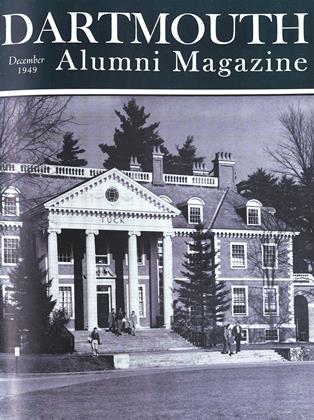Miss ILSE BISCHOFF is a professional painter of distinction (two drawings and an oil of hers are owned by Dartmouth College) and the value of her biographical novel on the life of Gilbert Stuart, Proud Heritage (Coward McCann, 1949), is considerably enhanced by this fact. She writes about Stuart with sympathy and understanding, and with a great technical knowledge of painting.
Gilbert Stuart is known to most Americans only, if at all,, as the painter of a well-known head of George Washington. Miss Bischoff, in an entertaining and easy style, remedies this and gives us in her book a rounded picture of this early American painter.
His life was not without its tragedy. Constantly in debt (and on occasion in debtor's prison), a lavish spender when he had money, temperamental, expatriate for nineteen years (he was unwilling to fight for the Patriot's cause), lover of many women, father of many children, he none the less wins our interest if not our entire sympathy. After reading Proud Heritage I wanted to know more about Stuart, see more of his pictures (it is unfortunate the publisher reproduced none in the book), and in general learn more about our early painters. I have begun with Homer Saint-Gaudens' The American Artist and His Times (Dodd, Mead, 1941).
Miss Bischoff's story begins with Gilbert Stuart returning across Narragansett Bay to scenes of his childhood, and from this nostalgic point the author launches into a story of his life from childhood to his death in Boston in 1828. We learn of his early love for music, of his childish handling of "oil and turpentine," of his five years' study in London with the great Benjamin West, of his marriage in 1786, of his children, his time in Dublin, his poverty, and of his struggle in America to which he returned in 1793. Of genuine interest is the story of his painting George Washington. He died leaving his family destitute, somehow characteristic of the man. As with many painters, or should I say artists in general, he was entirely too absorbed in self to be useful or much good to others in his personal life.
Proud Heritage is an enjoyable book for young or old and would be a fine thing to find under one's Christmas tree.
I suspect you will be hearing soon of an American edition of Eastern Approaches by Fitzroy Maclean (Jonathan Cape, London 1949). as it compares favorably with an earlier mentioned book, Chapman's The Jungle Is Neutral. Maclean was born in 1911 and educated in Eton and Cambridge, where he gained a first in Classics. In 1933 he entered the diplomatic service, soon- requested a Moscow post (not popular), and from this point travelled widely in Central Asia and the Caucasus. Commissioned in the Cameron Highlanders in 1941, he soon went out to the Middle East where he joined the Special Air Service Regiment, the first parachute unit to be formed in that theatre of war, and took part in some rather fabulous operations there. In 1943 he was a Lieutenant-Colonel, and as Brigadier and Winston Churchill's special representative, he was dropped by parachute into Yugoslavia where he contacted Tito's Partisans. He gives good reasons for not backing Colonel Mihajlovic's men who were more anxious to kill Partisans than they were Germans.
Although his first section on Moscow and Central Asia is most informative, and his second section most exciting, it is Part Three (Balkan War) which is most interesting today as it gives, so far as I know, the most impartial picture of Tito in English. Anyone interested in gaining an objective judgment on this man to- day will learn quite a bit from Maclean's pages. Certainly this is one of the top war books to come out of England. The author is now in Parliament (as a Conservative) from Lancaster, and is one of the best informed advisers of the British Foreign Office.
Eastern Approaches is recommended highly to all who want to be informed on European matters and also to those who like pure adventure which happens to be true.
Most everyone will admit that Somerset Maugham is a skillful story teller. Generally rated below certain windbags who write with great earnestness, Maugham deserves, and perhaps will have, a better fate than many of these. His latest book is before me, A Writer's Notebook, the signed limited edition the gift of a friend, and I am enjoying it vastly. He comments on writing, Russian novelists, travel, France, characters and plots which form his stories and many other things. To be read in small doses, and to be savoured like good wine.
"THE LOST WEEKEND" IS GIVEN TO DARTMOUTH: Charles Jackson (center) turns over the manuscript of his famous book to N. L. Goodrich '20h (left), College librarian, and Prof. Herbert F. West '22, secretary of the Friends of the Dartmouth Library, at a reception held in Baker's Treasure Room.
 View Full Issue
View Full Issue
More From This Issue
-
 Article
ArticleOUR GREATEST ISSUE
December 1949 By BRUCE W. KNIGHT -
 Article
ArticleNew Development Council Formed
December 1949 -
 Class Notes
Class Notes1923
December 1949 By TRUMAN T. METZEL, COLIN C. STEWART, JULIUS A. RIPPEL -
 Class Notes
Class Notes1918
December 1949 By ERNEST H. EARLEY, DONALD L. BARR, DAVID L. GARRATT -
 Class Notes
Class Notes1943
December 1949 By ELMER G. STEVENS JR., STANTON E. PRIDDY -
 Article
ArticleIt's An Old Spanish Custom of Speech
December 1949 By CHARLES L. YOUMANS '20
HERBERT F. WEST '22
-
 Article
ArticleHANOVER BROWSING
December 1935 By Herbert F. West '22 -
 Article
ArticleHanover Browsing
June 1937 By HERBERT F. WEST '22 -
 Article
ArticleHanover Browsing
December 1941 By HERBERT F. WEST '22 -
 Article
ArticleHanover Browsing
June 1944 By HERBERT F. WEST '22 -
 Books
BooksSPINDRIFT
November 1951 By Herbert F. West '22 -
 Article
ArticleHanover Browsing
June 1957 By HERBERT F. WEST '22







